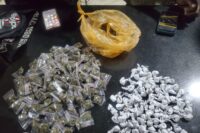The Zambian government lost an estimated K400 million between 2014 and 2017 as a result of the illicit tobacco trade, according to British American Tobacco (BAT) Zambia Plc.
But the company says it remains excited about the opportunities that the local tobacco industry has, given the progressive measures government has put in place to revive the sector.
In a statement, BAT Zambia board chairperson Michael Mundashi revealed that government lost at least K400 million in just a three-year period due to the illicit tobacco trade still prevailing in the country.
Illicitly-traded tobacco products typically include smuggled products that do not carry tax stamps.
“During the period 2014-2017, it is estimated that government lost K400 million in tax revenue as a result of the illicit cigarette industry. The revenue loss deprived government of funds required for infrastructure development and public service financing,” Mundashi stated.
“Illicit trade also undermines the investments that legal businesses make in infrastructure, their brands, retail partners and local suppliers.”
He, however, commended government for starting to tackle the vice, but added that more still ought to be done to eliminate it.
“We thank government for the initiative introduced recently to tighten border controls and increase enforcement. More, however, still needs to be done to eliminate this vice. The company will continue to work closely with the government to ensure that this leakage of the much-needed tax revenue is sealed, thereby, improving the inflows to the Treasury in support of the national development agenda,” Mundashi noted.
Data from BAT Zambia’s unaudited financial results for the half-year period ended June 30, 2018, shows that company’s contribution to the Treasury dropped by 47 per cent brought about by correspondingly lower gross revenues.
“The company’s contribution to Treasury in various taxes for the six-month period to June 30, 2018 was K26.8 million (2017: K50.76 million). This represents a reduction of 47 per cent, which is expected to increase following the completion of the factory project and expiry of the current tax holiday being enjoyed during the investment period,” Mundashi added.
“The company recorded gross revenue of K114.8 million for the six months ended June 30, 2018. This represents a drop of nine per cent from the K126.4 million recorded in the previous year. The drop in revenues was mainly driven by a price reduction that the company effected on part of the portfolio to drive and sustain the much-needed volume growth.”
Data further shows that BAT earned over K3.2 million in profit after tax during the period under review, largely triggered by government’s tax holiday to stimulate investment.
“The profit before taxation for the period under review was K3.2 million (2017: K0.13 million). There was no taxation charged for the period under review in line with the government’s agenda of attracting and promoting investment in various sectors of the economy under various programmes such as the LSMFEZ (Lusaka Multi-Facility Economic Zone),” data showed.
And Mundashi expressed optimism of a bright outlook for the company and industry in general given some progressive measures undertaken by government.
“With the commencement of the local manufacturing, the company has already shown signs of improved performance. The growth in sales volumes and increase in profitability are expected to continue in the second half. We are excited about the opportunities for the growth in the entire tobacco sector. The growth relies on there being a stable and predictable excise tax regime in place for tobacco products over the long-term,” stated Mundashi.












